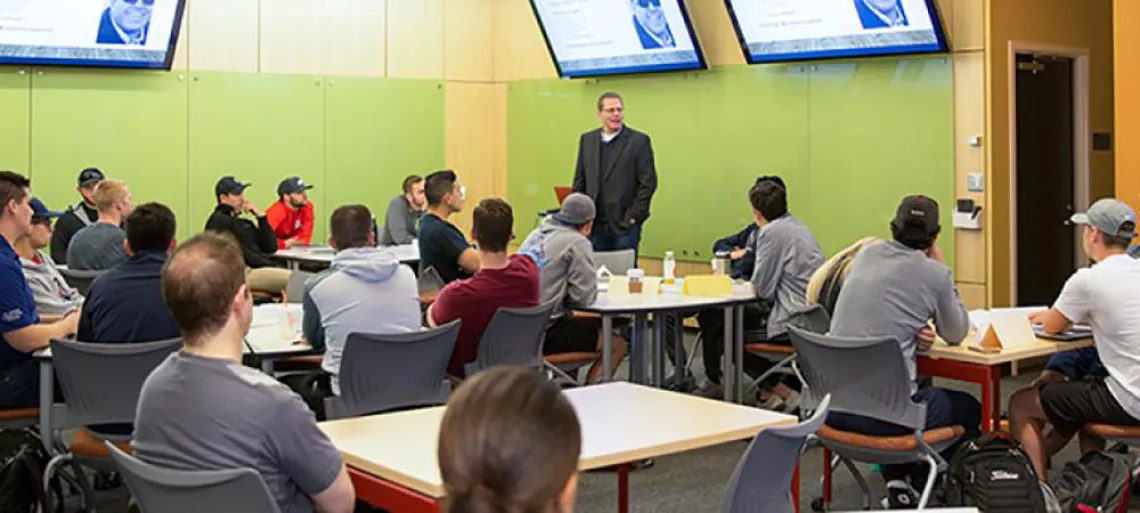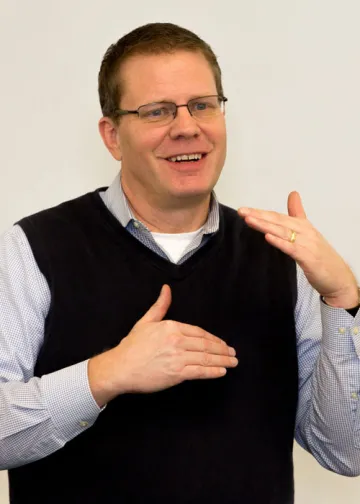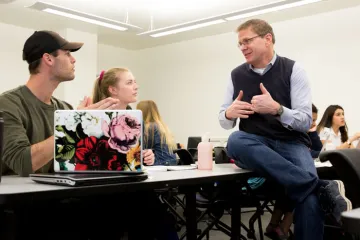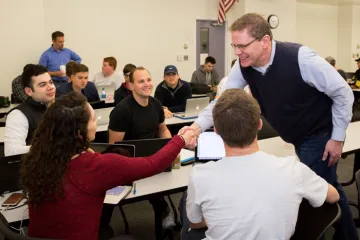Entrepreneurship Students Get Front-Row Seat To Corporate Social Responsibility In Action
University of Arizona students are getting a front-row seat to see corporate social responsibility in action thanks to a partnership between the McGuire Center for Entrepreneurship and its 2017 Social Impact Partner, Microsoft.


“Microsoft is proud to partner with the McGuire Center for Entrepreneurship to help support the outstanding entrepreneurship and social innovation education it provides to UA students and the community at large,” said Mike Miles, Senior Director of Datacenter Community Impact and General Engineering Manager of Microsoft Cloud & Infrastructure Operations. “Through social impact lectures, awards, and semester-long projects, Microsoft is encouraging students to make a positive social impact on the world.”
For Miles, who has spent half his career with Microsoft living abroad or managing international engineering teams, making social impact is not only part of his company’s vision, it’s also a personal mission. Through those experiences, he has seen firsthand a wide range of social issues, from extreme poverty and inadequate education systems in Africa, to lack of healthcare in South America, to insufficient access to clean water in parts of Asia.
“I’ve found that people who have less tend to want to help more, and that university students around the world have tremendous energy and passion for making a social impact,” Miles said. “Many of these people have inspired me to spend my time and energy personally making a difference and encouraging others – especially university students – to do the same.”
This spring, Miles spoke with students about corporate social responsibility and social innovation in each of the nine sections of ENTR 485 Innovating: Creating the Future. The hands-on summative course, required for nearly 1,000 business seniors each year, teaches students how to think like an entrepreneur by developing a business plan for an innovative product or service.
Miles also collaborated with McGuire Center lecturer Rick Yngve to pilot a special social impact section of ENTR 485. Rather than building a plan for a startup, the 42 students in the pilot section created business plans for locally optimized, but globally scalable social impact initiatives.
“What made this such an extraordinary learning opportunity is that it combines startups, corporate entrepreneurship, and social innovation together in one hands-on course,” said Yngve. “The real challenge of the class was fitting a new venture concept into an existing complex corporate structure. Students had to identify how to get it done, how to scale it globally, and how to make it sustainable while driving social impact.”
Community Impact

Miles, who is based in Redmond, Wash., visited in person once a month this semester to lead discussions and work directly with student teams as they developed business plans for a project focused on exploring ways to make a social impact in Microsoft’s datacenter communities. The new program leverages Microsoft talent, technology, and partnerships to drive positive impact on the 40 communities worldwide in which the datacenters that support the company’s cloud-based computing systems are located. The datacenter project is an aspect of Microsoft’s Cloud for Global Good, a corporate initiative that aims to ensure that the social and economic benefits of cloud computing can extend to everyone – not just a fortunate few.
“Being able to consult for Microsoft as one of my final projects at Eller has been an incredible opportunity,” said Alexis Scott (Finance, ’17), whose team developed a plan to empower Chicago communities to reduce crime and recidivism rates by providing law enforcement resources, and education and technology programs for students and inmates.
“This project forced me to piece together all of the skills I’ve learned through Eller to delve deep into the situation Microsoft is facing and provide a reasonable solution,” she added. “Mike was always available to answer questions, both in person and via email or Skype, which allowed our team to ensure our vision for this project aligns with Microsoft’s visions and goals. It’s amazing to know the work we are doing could actually make a difference in this world.”
Students formed nine teams, each focusing on a specific datacenter location in one of six states or internationally in Singapore, Ireland, and the Netherlands. Each team evaluated their community’s needs and resources, and determined opportunities to deliver hyper-local community engagement initiatives that are adaptable enough to be efficiency scaled globally. Students could utilize or tailor existing Microsoft social impact projects, or develop wholly original proposals.
“The value of the class is that students got to see how a company is truly grappling with how to make global social impact,” said Yngve. “This is a real challenge faced by companies today and the same ideation validation business modeling process applies whether a new venture is developed by a startup or within a larger company.”
Because each team identified opportunities to meet local needs, the business plans vary widely. The Washington team developed a plan to leverage Microsoft Cloud technology and infrastructure to use big data to improve the efficiency and sustainability of farming practices. The Singapore team identified the nation’s low ranking on global creativity scales as a major obstacle to business innovation, and proposed to increase creativity through coding play programs for youth. The Netherlands team proposed to incentivize companies and organizations to focus on providing sustainable and renewable products and initiatives to better their community and the world.
See photos of the Microsoft Partnership in action
“There is such energy, excitement and creativity about these projects,” Miles said. “It’s possible that I have learned more from listening to these students and how they think about the world than the students have learned from this project.”
That’s part of the benefit of the partnership for Microsoft, Miles said. The company gets additional creativity applied to the social impact problem space, as well as a new set of student ambassadors who can help tell Microsoft’s story about corporate social responsibility.
Miles said the benefit to Microsoft is twofold: The company gets additional creativity applied to the Social Impact problem space, and a new set of student ambassadors who can help tell Microsoft’s story about corporate social responsibility.
“It was inspiring and motivating to work with a Fortune 50 company that is trying to impact the world positively and wants our help to do it,” said Andrew Hall (Accounting ’17), who was on the Netherlands team.

Yngve highly commends the students in the Social Impact section for stepping up to the challenge of working with a real-world client, but is also quick to point out that the students benefited greatly from Microsoft’s involvement.
“Mike Miles was an incredible resource for students,” said Yngve. “He and other Microsoft colleagues were solid mentors who were invested in the success of our students, but they were also genuinely interested in learning from the students and being able to relate that back to what they are trying to do at Microsoft.”
Miles will attend the pitch competition April 27 when each of the teams presents their final proposals. While only one team will win the class competition, any number of proposals could be incorporated as datacenter community impact projects.
Beyond the Classroom
The McGuire Center-Microsoft partnership also extended beyond the classroom. Earlier this spring, Miles teamed up with McGuire Center faculty member Tristan Reader to present a McGuire Innovation Talk on Digital Access, Inclusivity, and Indigenous Populations. The company also sponsored the Microsoft Social Innovation Pavilion and hosted a booth at February’s McGuire Innovation Expo, a gathering of the local entrepreneurship community.
The partnership also encourages social impact considerations for new venture teams in the McGuire Entrepreneurship Program, an intensive yearlong experience that engages UA students from all fields of study in the process of moving an early-stage idea to a launch-ready venture. Microsoft awarded a $250 Social Impact Award at the Innovation Expo to FoodChange, a McGuire Program nonprofit venture focused on creating sustainable, healthy meals from imperfect produce that otherwise would go to waste.
“It was incredibly difficult to select a winner,” Miles said, “but after talking to all of the student teams and to other Microsoft colleagues who attended this event with me, FoodChange captured our attention through their mission to reduce food waste and the thoughtfulness that they conveyed about the positive social impact that their nonprofit can make not just in Tucson, but possibly in other areas around the US.”
Later this month, Miles will be part of a judging panel that will select another Social Impact Award winner – this time Microsoft is sponsoring a $5,000 prize at the New Venture Competition on April 28. The flagship event will feature 19 McGuire Entrepreneurship Program student startup teams presenting their innovative new ventures in a rapid-fire rocket pitch competition and trade show.
“Many of these student teams have a strong appreciation for the opportunity to make a positive social impact with their ventures,” Miles said. “I’m looking forward to seeing the teams show their potential for significant and scalable impact.”
New Aspect of Ongoing Relationship
While the partnership with the McGuire Center is new this year, Microsoft’s relationship with the University of Arizona extends much further. Microsoft has long had a relationship with the UA, from sponsoring MBA consulting projects in Eller to hiring computer science graduates, so the McGuire Center partnership is a natural extension of that relationship, Miles said.
“There is tremendous diversity in Southern Arizona which makes the University of Arizona an interesting place for Microsoft to learn and improve our ability to develop and recruit diverse talent,” he said. “Plus, the UA has strong DNA in entrepreneurship, which is a critical skill both at Microsoft and in most social enterprises.”
The Microsoft partnership comes at a time when the McGuire Center, traditionally known for its top-ranked entrepreneurship education programs, is expanding its social impact offerings. This year, the Eller Social Innovation and Eller Economic Development programs were brought under the umbrella of the McGuire Center, to further the Center's mission to empower students, individuals, and organizations through world-class education so they acquire the entrepreneurial mindset needed to change business and society.
“The contributions made by Microsoft enrich our students’ experience at the UA, and their ability to integrate social impact into their education and lives,” Arteaga said. “Having Microsoft’s support and expertise enhances our social impact programs and enables the Center to increase its local, regional, and national impact by providing more people with essential business skills, entrepreneurial and innovative mindsets, and tools for social impact.”

